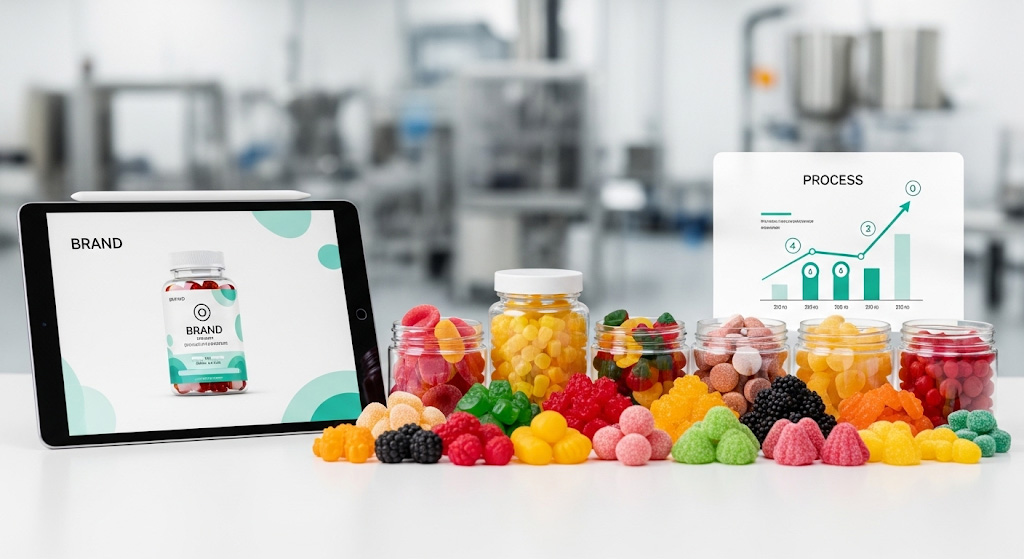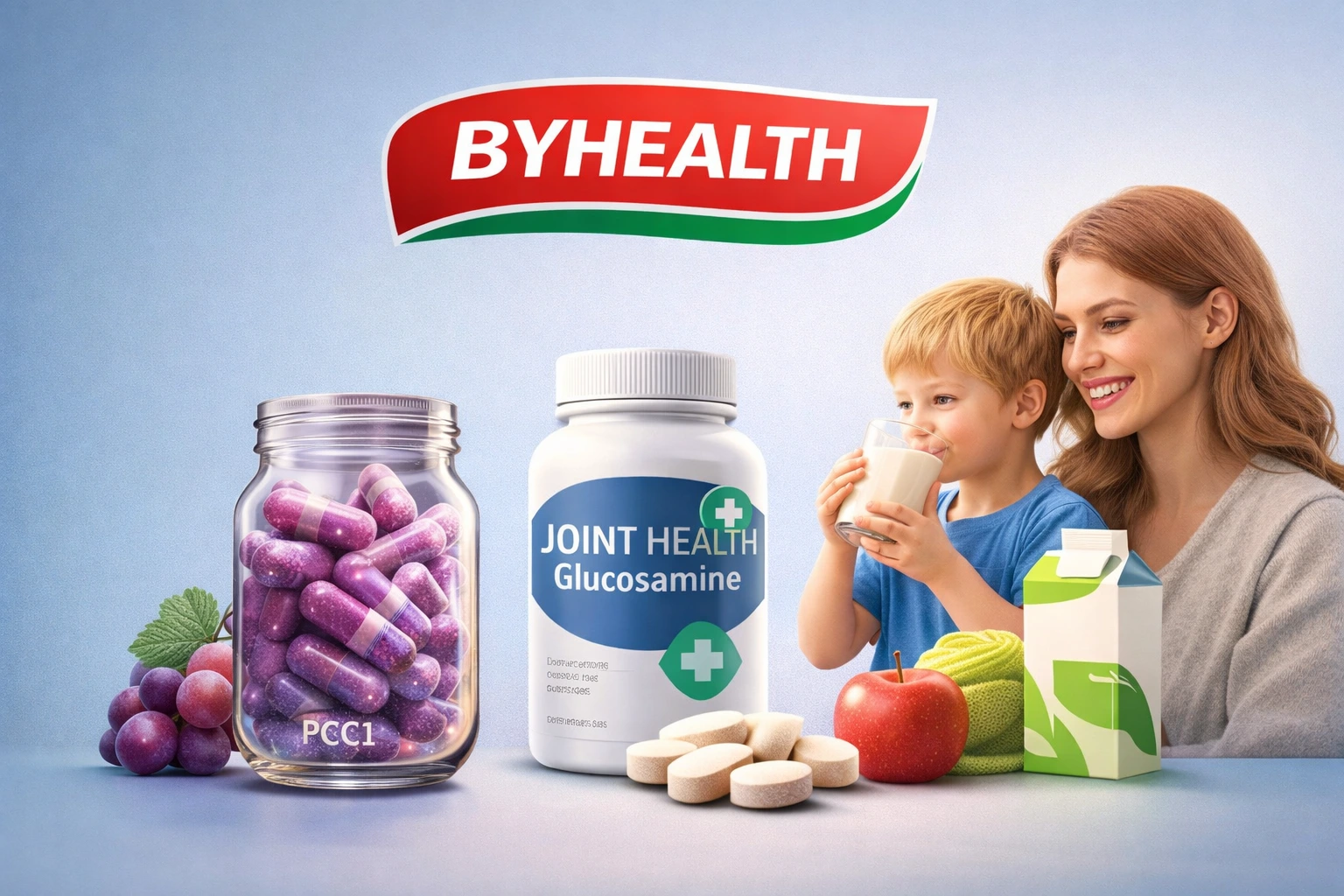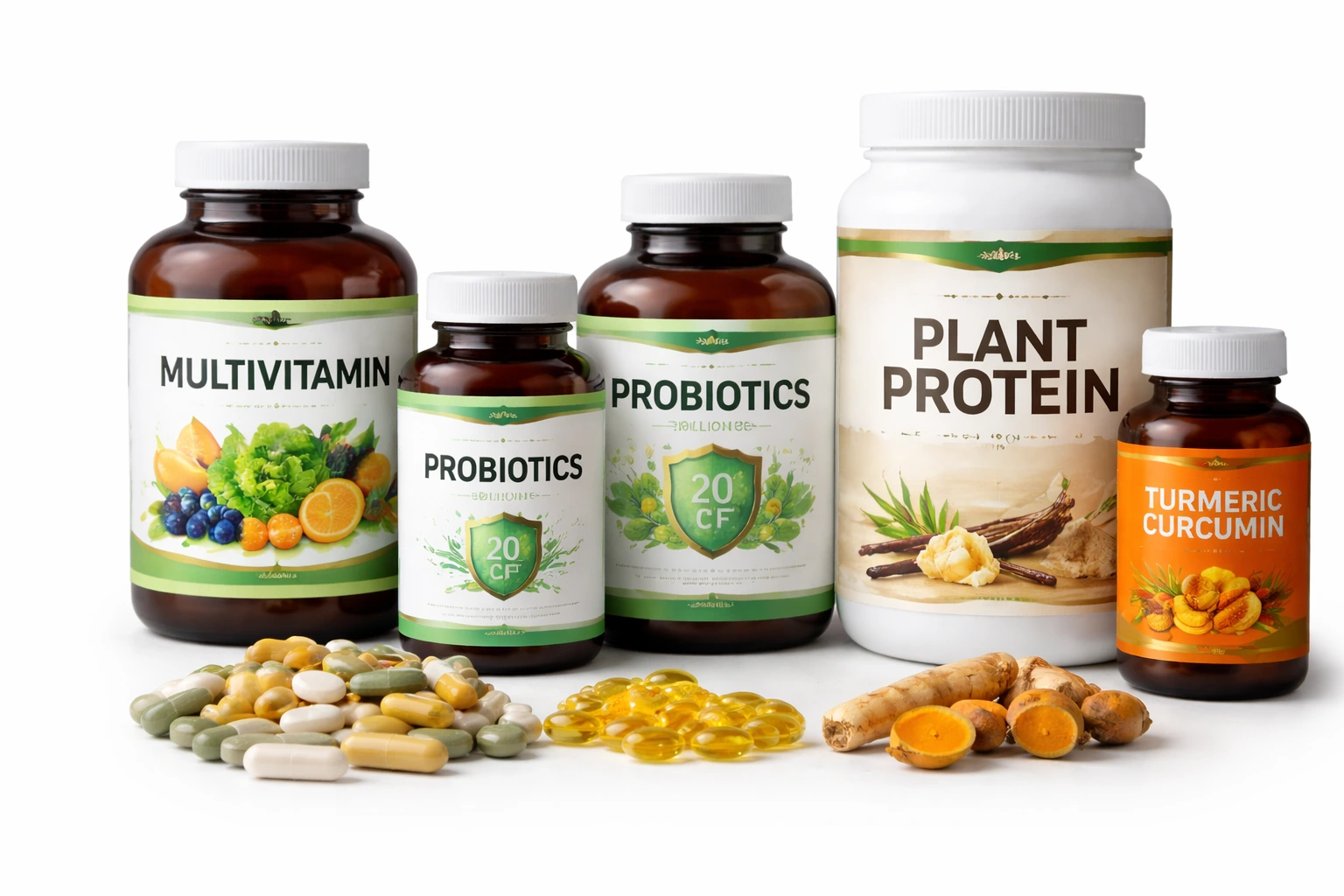Launching your own brand of dietary supplements can be an incredibly exciting and profitable venture, offering a direct path to address specific consumer needs in a booming market. Among the various supplement formats, gummy supplements have emerged as a particularly popular and accessible entry point. These delightful, chewable treats have redefined how many people, from picky children to adults who dread swallowing pills, meet their daily nutritional requirements. Their palatable taste and convenient format make them an instant hit.

This comprehensive guide will meticulously walk you through the entire process of establishing your own gummy supplement brand using the efficient route of private labeling. We'll cover everything from grasping the fundamentals of white label options and selecting the ideal manufacturing partner to crafting compelling packaging that captures your audience's attention.
About Zhongci Health
Zhongci Health is a leading supplement manufacturer dedicated to helping brands bring high-quality, innovative nutritional products to market. We specialize in providing comprehensive private label solutions, including a diverse range of white label multivitamin gummies expertly adapted to meet our customers' unique needs and requests, from initial formulation to final packaging design and production.
Step 1: Understanding White Label Gummies The Foundation of Your Brand
Before embarking on the journey of creating your unique supplement brand, it’s crucial to fully grasp the concept of white label gummies. Essentially, white label products are pre-formulated and pre-manufactured supplements produced by a third-party company. These ready-to-market products are then made available for you to purchase, rebrand with your distinct logo, brand name, and custom packaging, and sell as your own. Think of it as a meticulously prepared canvas, waiting for your unique artistic touch.
Key Advantages of Starting with White Label Gummies:
-
Accelerated Speed to Market: This is arguably the most significant benefit. Since the research, development, and complex manufacturing processes are already complete, you bypass lengthy and costly R&D phases. This allows you to launch your product significantly faster, often within weeks or a few months, giving you a competitive edge in a fast-paced market. Instead of spending a year or more on product development, you can focus on building your brand identity and initiating sales almost immediately.
-
Reduced Initial Investment & Risk: Developing a custom supplement formulation from scratch requires substantial upfront capital for ingredient sourcing, formulation trials, stability testing, and pilot runs. White label options eliminate a large portion of these costs. This lower barrier to entry makes it feasible for startups and smaller businesses to enter the supplement space with less financial risk. You're leveraging a manufacturer's existing, proven expertise and infrastructure.
-
Established Quality & Proven Efficacy: Reputable white label manufacturers operate under stringent quality control protocols and often possess a history of successful product formulations. They've already invested in the necessary stability testing, raw material vetting, and finished product analysis. This means you’re starting with a product that has a demonstrated track record of safety, quality, and efficacy, often backed by available certificates of analysis (CoAs) for both raw materials and finished goods.
-
Effortless Market Testing: White label gummies provide an excellent, low-risk strategy for testing market demand for specific supplement types or unique niches. You can launch a smaller batch of a popular formulation (e.g., a multivitamin or a biotin gummy) to gauge consumer interest and gather valuable feedback before committing to larger investments or developing highly specialized custom formulations. This iterative approach allows for agile business development.
Common White Label Gummy Formulations You'll Find:
Private label manufacturers typically offer a diverse portfolio of tried-and-true gummy formulations that are consistently in high demand. Familiarizing yourself with these options is crucial for identifying products that perfectly align with your brand's vision and target audience. Some of the most popular include:
-
Multivitamin Gummies: Offering a broad spectrum of essential vitamins and minerals, these are foundational for general wellness, often available for both adult and children's specific needs.
-
Vitamin C Gummies: A popular choice for immune support, often enhanced with natural fruit flavors.
-
Vitamin D Gummies: Essential for bone health, calcium absorption, and immune system modulation, especially in regions with limited sun exposure.
-
Biotin Gummies: Highly sought after for promoting healthy hair, skin, and nails.
-
Elderberry Gummies: A seasonal favorite, particularly for immune support during cold and flu seasons.
-
Sleep Support Gummies: Formulations typically containing melatonin, L-theanine, or other natural ingredients to aid relaxation and promote healthy sleep patterns.
-
Omega-3 Gummies: Providing essential fatty acids (EPA and DHA) crucial for brain and heart health, often with natural fruit flavors to mask any fishy aftertaste.
-
Probiotic Gummies: Designed to deliver beneficial live bacteria for gut health and digestive balance, often formulated with specific strains for stability.
-
Collagen Gummies: Targeted for skin elasticity, joint health, and overall beauty-from-within benefits.
By selecting from these established white label options, you can quickly enter the market with products consumers are already actively seeking.
Step 2: Selecting the Right Private Label Gummy Manufacturer Your Strategic Partner
The choice of your private label gummy manufacturer is arguably the most pivotal decision in launching your brand. This entity will be your strategic partner, directly responsible for the quality, safety, and consistency of your products. A thorough vetting process is non-negotiable.
Key Criteria for Manufacturer Selection:
-
Product Range and Formulation Expertise:
-
Beyond just offering common white label gummies, assess the depth and breadth of their product catalog. Do they specialize in certain ingredients or dietary niches (e.g., vegan gummies, sugar-free options)?
-
Inquire about their R&D capabilities. Even for white label, understanding their scientific backing for existing formulations provides confidence.
-
Crucially, request samples of the specific white label gummies you're interested in. Evaluate their organoleptic properties (taste, texture, aroma), visual appeal, and overall consistency. Compare samples from different manufacturers to ensure you select one that meets your quality standards.
-
-
Manufacturing Standards and Certifications:
-
cGMP (Current Good Manufacturing Practices) Compliance: This is the absolute minimum requirement. Ensure the manufacturer is registered with the FDA and strictly adheres to 21 CFR Part 111 (for dietary supplements in the U.S.). Request their cGMP audit reports or relevant documentation.
-
Third-Party Certifications: Look for additional certifications from reputable independent bodies like NSF International, UL, USP, or TGA (Therapeutic Goods Administration). These certifications indicate an even higher level of quality assurance and adherence to stringent standards.
-
Specific Dietary Certifications: If your target market requires them, verify if the manufacturer holds certifications for Vegan, Kosher, Halal, or Non-GMO Project Verified production lines.
-
Quality Control (QC) Procedures: Inquire about their internal QC processes, including raw material incoming inspection, in-process controls, and finished product testing. Do they perform full panel testing for contaminants (heavy metals, microbes, pesticides) and potency verification? Request Certificates of Analysis (CoAs) for their existing white label products.
-
-
Minimum Order Quantities (MOQs):
-
MOQs vary significantly among manufacturers. Some may have MOQs as low as a few thousand units, while others require tens of thousands. It's critical to choose a manufacturer whose MOQs align with your initial budget, storage capacity, and planned sales volume. Starting with lower MOQs can mitigate financial risk for new brands.
-
-
Lead Times:
-
Understand their typical lead times from order placement to product delivery. This will directly impact your inventory management, marketing schedule, and overall brand launch timeline. Inquire about current production queues and any potential seasonal fluctuations in lead times.
-
-
Pricing Structure and Value:
-
Obtain detailed, transparent pricing information. Beyond the per-unit cost, ask about any setup fees, tooling charges (if any customization), labeling costs, packaging costs, and shipping logistics.
-
Don't just compare raw price; evaluate the overall value. A slightly higher per-unit cost might be justified by superior quality, better service, lower MOQs, or additional value-added services like integrated packaging.
-
-
Customization and Future Scalability:
-
While you're starting with white label, inquire about their capabilities for future custom formulations, unique flavor profiles, specific shapes, or specialized active ingredient blends. A manufacturer who can grow with you offers long-term strategic value.
-
Discuss their production capacity. Can they scale up efficiently as your brand grows without compromising quality or lead times?
-
-
Integrated Services (Packaging & Labeling):
-
Many full-service private label manufacturers offer integrated packaging and labeling services. This can significantly streamline your supply chain by consolidating vendors and reducing coordination efforts. If they don't, you'll need to factor in the time, cost, and logistics of working with separate packaging suppliers and co-packers.
-
-
Communication, Transparency, and Customer Support:
-
Effective communication is paramount. Choose a manufacturer that is responsive, transparent about their processes, and provides dedicated account management or excellent customer support throughout your partnership. Clear communication minimizes misunderstandings and ensures a smoother workflow.
-
-
Geographic Location:
-
Consider the manufacturer's location relative to your distribution centers or target markets. Proximity can impact shipping costs, transit times, and potentially simplify regulatory navigation, especially if operating within the same country (e.g., U.S. based for U.S. distribution).
-
Conducting Thorough Due Diligence:
-
Request Comprehensive Quotes: Don't settle for simple price lists. Ask for detailed quotes that break down all costs.
-
Visit the Facility (if feasible): An on-site visit can provide invaluable insights into their operations, cleanliness, and professionalism.
-
Check References: Request and meticulously check references from other brands they have partnered with. Ask about their experience with quality, lead times, communication, and problem resolution.
-
Review Online Presence and Reputation: Search for online reviews, news articles, or industry discussions to gauge their general reputation and address any potential red flags.
Step 3: Branding and Packaging Design Your Brand's Visual Identity
Once your manufacturer is selected and your white label gummy products are chosen, the exciting phase of developing your brand identity and designing compelling packaging begins. This step is critical because your branding and packaging are what will truly differentiate your products in a crowded market, communicate your value proposition, and ultimately attract your target audience.
Core Elements of Your Brand Identity & Packaging:
-
Brand Name and Logo: These are the cornerstones of your brand.
-
Brand Name: Choose a name that is memorable, easy to pronounce, relevant to your product/values, and legally available (check trademarks!). Consider names that evoke health, nature, fun, or the specific benefit of your gummies.
-
Logo: Invest in a professional, versatile logo that is visually appealing and effectively conveys your brand's essence. It should be scalable for various applications, from small gummy bottles to large banners.
-
-
Define Your Target Audience: Before any design work, deeply understand who your ideal customer is. Are they parents looking for children's vitamins? Health-conscious millennials seeking vegan options? Athletes needing specific nutrients?
-
Demographics: Age, gender, income, location.
-
Psychographics: Values, lifestyle, health goals, pain points related to supplements.
-
Understanding your target audience will fundamentally inform every design decision, from color palette to font choice and imagery.
-
-
Brand Messaging and Story: Beyond just a product, consumers connect with a brand's narrative.
-
Brand Message: Develop a clear, concise, and compelling message that highlights the unique selling points of your gummy supplements (e.g., "The tastiest way to better immunity," "Pure, plant-based goodness for your daily dose").
-
Brand Story: Craft a compelling narrative around your brand's origin, values, and mission. Why did you start this brand? What problem are you solving? This helps build emotional connection and trust.
-
-
Packaging Type Selection: The physical container for your gummies is crucial for protection, convenience, and shelf appeal.
-
Common Types: Consider standard supplement bottles (plastic or glass), stand-up pouches, or even individual blister packs for single servings.
-
Factors to Consider: Cost, desired shelf life, product protection (e.g., moisture barrier for hygroscopic gummies), ease of use for consumers, and sustainability goals.
-
-
Label Design: Your Silent Salesperson: The label is your primary communication tool and must meet both aesthetic and regulatory demands.
-
Visual Appeal: The design should be eye-catching, unique, and consistent with your brand's overall look and feel.
-
Information Hierarchy: Ensure crucial information is easily digestible. Your brand name and product name should be prominent.
-
Required Elements: The label must clearly display your brand name and logo, the product name (e.g., "Kids Multivitamin Gummies"), the Supplement Facts panel (meticulously following FDA/local regulations for nutrient content, serving size, etc.), a complete ingredient list (active and inactive), net quantity, suggested use, warnings (e.g., "Keep out of reach of children," "Consult a doctor if pregnant/nursing"), and manufacturer/distributor information.
-
-
Color Scheme and Imagery: These elements evoke emotion and communicate brand personality.
-
Color Palette: Choose colors that align with your brand's message and appeal to your target demographic. Bright, cheerful colors are common for gummies, but a more subdued, natural palette might suit an organic or premium brand.
-
Imagery: Use high-quality imagery (e.g., fruit illustrations, happy family photos, clean health visuals) that reinforces your brand's identity and product benefits.
-
-
Regulatory Compliance in Design: This cannot be overstressed. All claims, ingredients, and nutritional information on your label must strictly adhere to regulatory guidelines. Misleading claims or incorrect labeling can lead to product recalls and severe penalties.
-
Sustainability Considerations: As consumers become more environmentally conscious, consider incorporating sustainable packaging materials (e.g., recycled plastic, biodegradable pouches) or minimalist designs to reduce waste. This can be a strong selling point for your brand.
Collaborating with Design Professionals:
Unless you possess extensive in-house graphic design and regulatory labeling expertise, it is highly advisable to partner with professional graphic designers or branding agencies. Look for those with a proven track record in the dietary supplement, food, or health product sectors. They can translate your vision into a visually compelling and, crucially, fully compliant brand identity and packaging that genuinely stands out in a crowded marketplace.
Step 4: Navigating Regulations and Compliance Your Brand's Safeguard
The dietary supplement industry is subject to rigorous oversight designed to protect consumer health and ensure fair trade practices. Successfully launching your gummy brand requires unwavering commitment to and deep understanding of these regulations. Non-compliance can lead to severe consequences, including product recalls, hefty fines, and irreparable damage to your brand's reputation.
Pivotal Regulatory Considerations:
-
FDA cGMPs (Current Good Manufacturing Practices): Your chosen private label manufacturer must operate in strict adherence to FDA's cGMPs (21 CFR Part 111) for dietary supplements. As the brand owner, you also bear responsibility for ensuring that the products you sell are manufactured, packaged, labeled, and held in compliance with these regulations. This means having confidence in your manufacturer's:
-
Facility Controls: Proper sanitation, pest control, and environmental monitoring.
-
Equipment Maintenance: Regular calibration and cleaning protocols.
-
Personnel Training: Qualified and trained staff at all levels of production.
-
Raw Material Control: Robust incoming inspection, identity testing, and quality verification of all ingredients.
-
In-Process Controls: Monitoring critical parameters during blending, molding, and cooling.
-
Finished Product Testing: Verification of potency, purity, and absence of contaminants (heavy metals, pesticides, microbial pathogens).
-
Batch Records: Meticulous documentation of every step for full traceability.
-
Stability Testing: Scientific studies to confirm that the product maintains its identity, purity, strength, and composition throughout its declared shelf life. This is particularly important for gummies, which can be sensitive to moisture and heat.
-
-
Labeling Regulations: This is a complex area requiring meticulous attention. Your gummy supplement labels must strictly comply with all FDA (or relevant national authority) regulations. This includes:
-
Supplement Facts Panel: Precise formatting, accurate nutrient content per serving, and correct units of measure.
-
Ingredient Declaration: Listing all active and inactive ingredients in descending order of predominance by weight.
-
Allergen Warnings: Clear declaration of major food allergens (e.g., milk, soy, tree nuts, wheat, fish) if present.
-
Net Quantity of Contents: Accurate weight or count of gummies in the container.
-
Manufacturer/Distributor Information: Name and place of business.
-
Directions for Use: Clear and concise instructions for consumption.
-
Warning Statements: Any required warnings (e.g., "Keep out of reach of children," "Consult a healthcare professional if pregnant or nursing, or if you have a medical condition").
-
-
Product Claims and Marketing:
-
Truthful and Not Misleading: All claims made on your packaging, website, and marketing materials must be truthful, substantiated by scientific evidence, and not misleading.
-
Structure/Function Claims: Dietary supplements are generally permitted to make structure/function claims (e.g., "supports bone health," "promotes digestive balance") that describe the role of a nutrient or dietary ingredient intended to affect the structure or function of the human body.
-
No Disease Claims: Dietary supplements cannot claim to diagnose, cure, mitigate, treat, or prevent any disease. This is a critical distinction, and blurring this line can lead to severe regulatory action.
-
-
Adverse Event Reporting (AER): As a brand owner, you are legally required to establish procedures for receiving, evaluating, and submitting reports of serious adverse events associated with your products to the FDA.
-
State and Local Regulations: Be aware that some states or local jurisdictions may have additional specific requirements for dietary supplements sold within their boundaries.
-
International Regulations: If you plan to sell internationally, you'll need to understand and comply with the specific regulations of each target country (e.g., Health Canada for Canada, EFSA and national food agencies for the EU, TGA for Australia).
The Indispensable Role of Expert Consultation:
Navigating the intricate web of dietary supplement regulations can be daunting. It is highly recommended, especially for new brands, to consult with regulatory experts or legal professionals who specialize in the dietary supplement industry. Their expertise can help you ensure full compliance, avoid common pitfalls, review your labels and claims, and establish robust internal processes, saving you from potentially costly mistakes and legal liabilities down the line.
Step 5: Marketing and Sales Strategy Bringing Your Gummies to Market
With your branded and meticulously packaged private label gummies ready, the final, exhilarating step is to develop and execute a robust marketing and sales strategy. This is how you'll reach your target audience, build brand loyalty, and ultimately drive sales for your delicious new line of supplements.
Key Marketing and Sales Channels to Consider:
-
E-commerce Website (Your Digital Storefront):
-
Invest in a professional, user-friendly e-commerce website that clearly showcases your products, brand story, and values.
-
Optimize your site for mobile responsiveness and fast loading times.
-
Implement secure payment gateways and clear shipping policies.
-
Integrate strong product descriptions, high-quality images, and customer reviews.
-
-
Online Marketplaces:
-
Platforms like Amazon (FBA or FBM), eBay, Walmart.com, and specialized health marketplaces can provide immediate access to vast customer bases.
-
Understand the specific rules, fees, and competitive landscape of each platform. Optimize your product listings with compelling descriptions, relevant keywords, and high-quality images.
-
-
Social Media Marketing:
-
Leverage platforms where your target audience spends their time (e.g., Instagram, Facebook, TikTok, Pinterest).
-
Develop engaging content that highlights the benefits, flavors, and convenience of your gummies. Use eye-catching visuals, short videos, and relatable narratives.
-
Run targeted paid ad campaigns to reach specific demographics and interests.
-
Encourage user-generated content and foster a community around your brand.
-
-
Content Marketing (Educate & Attract):
-
Create valuable, informative content such as blog posts, articles, FAQs, and videos that address common health concerns, explain the benefits of specific ingredients, or clarify supplement science.
-
Optimize your content with relevant keywords (e.g., "best multivitamin gummies," "vegan vitamin D gummies benefits") to attract organic search traffic.
-
Position your brand as a trusted source of health information, building authority and credibility.
-
-
Email Marketing (Nurture & Retain):
-
Build an email list through your website and other channels.
-
Use email newsletters to share valuable content, announce new products, offer exclusive discounts, and send personalized promotions.
-
Email marketing is highly effective for nurturing leads and fostering customer loyalty through repeat purchases.
-
-
Influencer Marketing:
-
Collaborate with health and wellness influencers, nutritionists, or fitness professionals whose audience aligns with your target market.
-
Influencers can create authentic content showcasing your gummies, reaching a highly engaged and relevant audience.
-
-
Retail Partnerships:
-
Explore opportunities to get your gummy supplements into brick-and-mortar retail stores, including health food stores, pharmacies, grocery chains, and specialty boutiques.
-
This often involves creating compelling pitch decks, understanding retail distribution channels, and potentially attending trade shows.
-
Developing a Comprehensive Marketing Plan:
-
Refine Your Target Audience: Go beyond demographics to understand their motivations, purchasing habits, and where they seek health information.
-
Set Clear, Measurable Goals: What do you want to achieve (e.g., specific sales targets, brand awareness metrics, customer acquisition costs)?
-
Budget Allocation: Allocate your marketing budget strategically across chosen channels.
-
Create a Content Calendar: Plan your content creation and distribution in advance.
-
Monitor and Adapt: Continuously track your marketing performance using analytics. Be prepared to analyze what's working and what isn't, and adjust your strategy accordingly to maximize your ROI.
Launching your own brand of private label gummy supplements offers a streamlined and accessible path into the thriving dietary supplement market. By meticulously navigating the steps outlined above – from understanding the advantages of white label options and selecting a reliable, cGMP-compliant manufacturer, to crafting compelling branding and ensuring stringent regulatory adherence – you can successfully bring your own line of delicious, effective, and compliant gummy vitamins to eager consumers. Remember to consistently prioritize quality, cultivate a strong and authentic brand identity, and implement a strategic, data-driven marketing plan to achieve sustained success in this dynamic and rewarding industry.






